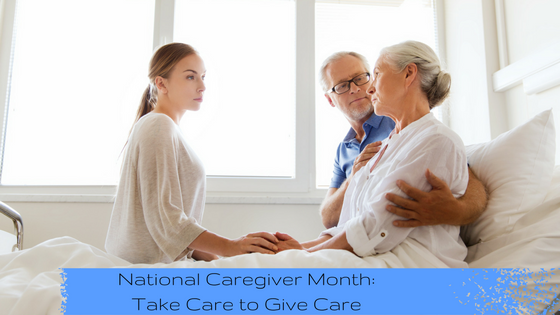National Caregiver Month: Take Care to Give Care
Perhaps no one understands the challenges of caregiving more than a caregiver. Sure, that seems obvious, but caregiving is a unique occupation that includes its share of rewards, but also its share of physical and mental stress.
November is National Caregiver Month and this year’s theme is “Take Care to Give Care.” It addresses caregiving’s challenges and the need for caregivers to take care of themselves while taking care of others.
How can you, as a caregiver of someone who is in an inpatient rehabilitation facility or long-term acute care hospital, ensure that you’re meeting your own physical and mental needs? Here are some tips:
- Don’t Always Put Yourself ‘Last’
The list of caregiving responsibilities can be long, indeed, from managing medications to monitoring your patient’s progress, and it can be easy to forget about your personal needs – sometimes to the point of sacrificing your own health. That’s why it’s helpful to set personal health goals such as making a commitment to be physically active a certain number of days per week or establishing a consistent sleep routine.
- Proper Nutrition is Vital
It’s important to maintain your strength, energy, and stamina to meet the demands of your day-to-day duties, while also strengthening your immune system. A great way to do this is by making sure you’re getting proper nutrition and maintaining a healthy diet.
- Understand How the Stress of Caregiving Impacts Your Health
Research has shown that one out of five caregivers say that they have sacrificed their physical health while performing their occupational duties. Caregivers, whether family caregivers or those who provide care in a professional setting, have on average more health and emotional problems than people in most other occupations. For example, caregivers are twice as likely to suffer depression and are at increased risk for many other chronic conditions.
- Rest. Recharge. Respite.
You may feel that there’s not enough time to rest and recharge your batteries. But doing so is vital, especially when you consider that caregivers are at a higher risk of health issues due to chronic stress. Take advantage of every opportunity to re-energize and give your mind and body a break.
- Seek Support From Other Caregivers
Take time to find out about caregiving resources in your community. A caregiver support group can provide problem-solving strategies but also validation and encouragement. It can also be a place to develop meaningful relationships.
- Accept Help
It can be easy to put all the burden on your shoulders while believing that you shouldn’t have to ask for help. But create a list of ways that others can help and don’t be afraid to ask, or accept, their help.
- Focus on What You Can Do
There’s no such thing as a ‘perfect’ caregiver, and it’s important to remind yourself that you’re doing the best you can at any given moment or situation. Focus on the positives and believe that you’re making the best decisions.








Leave a Reply
Want to join the discussion?Feel free to contribute!